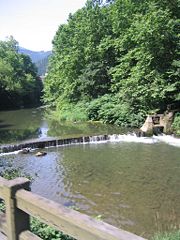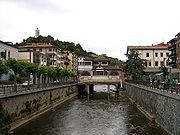
Urola
Encyclopedia


Spanish language
Spanish , also known as Castilian , is a Romance language in the Ibero-Romance group that evolved from several languages and dialects in central-northern Iberia around the 9th century and gradually spread with the expansion of the Kingdom of Castile into central and southern Iberia during the...
Guipúzcoa), Basque Country
Basque Country (autonomous community)
The Basque Country is an autonomous community of northern Spain. It includes the Basque provinces of Álava, Biscay and Gipuzkoa, also called Historical Territories....
, Spain.
The river is only 55 kilometres in length, and runs from headwaters in the Aizkorri Mountains, near the town of Legazpi
Legazpi, Spain
Legazpi is a city in the Gipuzkoa province of the Autonomous Community of Basque Country, northern Spain.Legazpi is a town of about 9000 inhabitants located on top of Urola valley, in Guipuzcoa...
to its outflow into the Cantabrian Sea at the town of Zumaia
Zumaia
Zumaia is a small town in the north of Spain in the Basque Country. The Mayor is Iñaki Agirrezabala, member of Eusko Alkartasuna and Gazte Abertzaleak....
on the Bay of Biscay
Bay of Biscay
The Bay of Biscay is a gulf of the northeast Atlantic Ocean located south of the Celtic Sea. It lies along the western coast of France from Brest south to the Spanish border, and the northern coast of Spain west to Cape Ortegal, and is named in English after the province of Biscay, in the Spanish...
. It passes through the towns of Azkoitia
Azkoitia
Azkoitia is a town located in the province of Gipuzkoa, in the Autonomous Community of Basque Country, in the northern Spain...
and Azpeitia
Azpeitia
Azpeitia is a town and municipality within the province of Gipuzkoa, in the Basque Country of Spain, located on the Urola river a few kilometres east of Azkoitia. Its population is 13,708 . It is located 16 miles southwest of Donostia/San Sebastián.Azpeitia is the birth place of Ignatius of Loyola...
.
The word urola comes from two basque words Ur and Ola, meaning "water" and "factory" respectively referring to the water mills which have stood in the valley since the Middle Ages.

